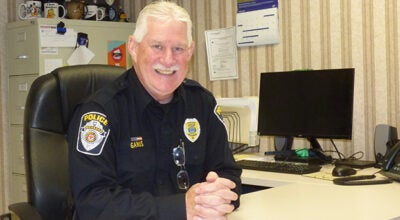‘Connecting Careers’ at SMC
Published 5:48 pm Monday, March 24, 2014

Area students inspect a video game console at a mechatronics event at SMC’s Niles campus. (Submitted photo)
Even those unfamiliar with the term “mechatronics” easily grasp its status as a destination for in-demand jobs.
“Students I have right now graduating May 3 already have jobs. They’re doing internships at about $16 an hour, then they’ll be making $20 an hour with their associate degree,” Southwestern Michigan College instructor Michael McGowan said. “Within the mechatronics field you can stay local, regionally, nationally or internationally. I traveled the world for many years as a control engineer before I got into teaching. A gentleman who graduated one year ago is making $40,000 now, but when he hits his anniversary will be making $70,000. He has already designed and built his first machine and installed it and is getting ready to go to India to do his second.”
“It’s a very, very high-demand field right now,” McGowan said. “I’ve got people who call all the time and want graduates of the program. I can’t give them enough.”
A relatively new interdisciplinary field, mechatronics incorporates robotics/automation, electronics, computer components and control systems.
SMC students learn to integrate a Programmable Logic Controller, or PLC, with a CNC (computer numerical control) mill.
SMC’s mechatronics program contains two robotics courses.
Of two robots in the classroom before him, one is hooked to a MIG welder. The other handles materials.
An HMI, or Human Machine Interface, is a tablet-sized controller with 12 push buttons.
“The second is a vision class. There’s a video camera on the material-handling robot,” he said. “You have to be able to program it, identify the parts and figure out how to orient the robot to go get parts. These (by FANUC) are 50 to 60 percent of robots you’ll see in industry.”
Coupled with experience on a second brand, Motoman, “gives graduates a lot more clout when they knock on doors.”
PLCs “are devices used in automation,” McGowan said. “They take in signals from switches on machinery, analyze them and turn on outputs that turn on valves or motors, having them make motion, then monitoring it. Students also learn pneumatics and hydraulics.”
McGowan was one of four Niles Campus teachers, along with Michael Chaddock and Nathan Kramb (welding) and David Maxwell (Precision Production Tech, or PPT), who welcomed more than 100 students March 21, including 25 from Brandywine, 15 from Constantine and 62 from the Elkhart, Ind., Area Career Center.
Brandywine and Constantine toured nearby Delta Machining after a pizza lunch.






